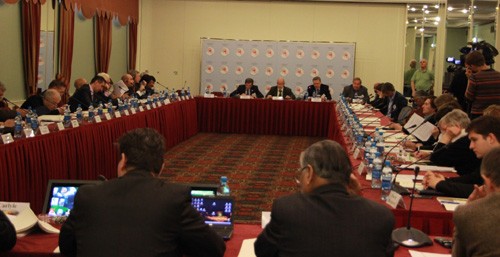(VOVworld) – The East Sea smoulders with instabilities but the situation in improving. One positive sign is that the Association of Southeast Asian Nations (ASEAN) has unified and regained prestige in handling East Sea issues. ASEAN began consultations with China on the Code of Conduct of Parties in the East Sea (COC) and the East Sea has become an issue of international concern.
 |
The 1st international conference on East Sea security and cooperation in Moscow in Oct, 2013
|
The East Sea has a strategic importance not only for regional countries but also for Asia-Pacific and the US. Because of its vital position, the area contains implicit instabilities. Over the years, countries in the region have become determined to apply regulations and other peaceful measures to handle disputes, based on international law.
Consensus for a region of peace, security, and cooperation
A significant step in 2013 was ASEAN reaching high consensus on East Sea issues. The East Sea has been widely discussed at ASEAN conferences and mentioned in the bloc’s documents and the ASEAN President’s declarations. ASEAN has always affirmed the importance of ensuring peace, stability, security, and safety in the East Sea, resolving disputes by peaceful measures, and respecting international law. This is a remarkable change in ASEAN’s stance on East Sea issues since 2012. Deputy Foreign Minister Pham Quang Vinh says: "This is a view of ASEAN countries which is supported by other countries, including China. Peace and security in the region and the East Sea is the common concern of all countries. We respect international law and the 1982 UN Convention on the Law of the Sea, UNCLOS. Countries have to abide by commitments and agreements, including the Declaration on the Conduct of Parties in the East Sea (DOC) signed between ASEAN and China and the Declaration on 6 principles of the East Sea approved by ASEAN in July 2012."
Drawing world attention
East Sea issues have drawn the attention of the world community. The number of symposiums and forums on the East Sea has been part of the agenda of many regional and world conferences. Foreign scholars, researchers, and lawyers have debated and analyzed East Sea disputes from political, legal, and historical perspectives, smoldering threats and a regional arms race, and possible solutions to handle disputes peacefully and sustainably for mutual benefit.
Countries have agreed to apply international law and UNCLOS 1982 in dealing with East Sea issues. No country has the right to make claims contrary to the legal foundation and regulations of UNCLOS 1982.
China and ASEAN conducted the 1st consultation on the Code of Conduct of Parties in the East Sea (COC) in China last September. It was an important step in the process to seek peaceful solutions in the East Sea. Deputy Foreign Minister Pham Quang Vinh: “The COC reaffirms the positive regulations and procedures of the DOC, which comply with international law and the Convention on the Law of the Sea, and respect the special economic zones and continental shelf of every coastal nation. In order to better guarantee maritime peace, security, and safety, the COC must uphold and promote DOC regulations and create mechanisms to monitor the enforcement of the Code of Conduct in the future.
Vietnam’s responsibility in maintaining peace in the East Sea
Vietnam recorded many important external relations achievements in 2013, including maintaining peace and stability in the East Sea. Economic activities took place normally at Vietnam’s beaches and special economic zones. Vietnam has fought against activities hampering its fishermen working in its national sea territory.
Vietnam always affirms that national interests are inseparable from regional interests. Vietnam insists that not only countries bordering the East Sea are involved, that all ASEAN countries must assure responsibility for maintaining peace in the East Sea.